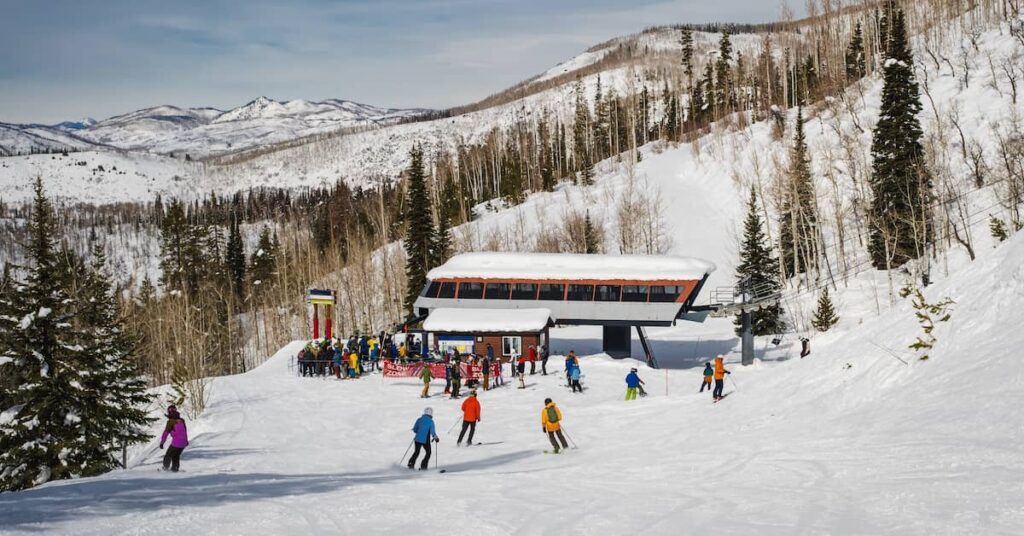
Are Ski Resorts Liable for Accidents?
After being injured on the slopes, you might be asking yourself, “Are ski resorts liable for accidents?” The sheer joy of gliding down snow-covered terrain can sometimes overshadow the inherent risks of skiing, snowboarding, and other winter sports. As a result, you may never have thought to consider liability in a ski accident. Yet, it becomes of paramount concern when facing medical bills and lost wages.
If you have been injured on the mountain in Colorado, it is important to know if you can hold ski resorts liable for accidents. With local insight and national resources, the trusted ski accident attorneys at Burg Simpson can help determine who is responsible for your losses and pursue rightful compensation. Call 303-792-5595 today for a FREE and confidential case evaluation.
Can Ski Resorts Be Liable for Accidents?
The question remains: are ski resorts liable for accidents under certain circumstances? While waivers and disclaimers are abundant, attempting to limit resort liability, there are situations where they can be held accountable.
Maintenance Lapses
Accidents arising from poor upkeep, such as defective chair lifts or unmarked obstacles, can warrant resort liability. Consider a chairlift malfunctioning due to inadequate or neglected maintenance, and as a result, a guest is injured.
It is discovered that the resort management was aware of intermittent issues with the lift but continued to operate it. Maintenance logs reveal a lack of regular inspections and repairs, and some vital components had exceeded their lifespan without replacement.
The ski resort could be liable for the guest’s injuries in this situation. Their failure to adequately maintain and repair the chairlift, despite being aware of its issues, directly contributed to the accident. Such negligence, stemming from maintenance lapses, can be a clear case of liability on the part of the resort, making them accountable for the injured guest’s medical bills, pain, suffering, and other damages.
Employee Training Deficiencies
Inadequately trained staff causing mishaps can place liability on the resort. Consider a first-time skier enrolling in a beginner’s ski lesson at a reputable resort. The instructor assigned to the group is enthusiastic but inexperienced and has not undergone the resort’s full training regimen due to a staff shortage.
During the lesson, the instructor takes the group down a slightly steeper gradient, believing it to be a manageable challenge. However, they fail to provide clear guidance on how to navigate the slope safely or execute a controlled stop. This results in one of the students crashing and sustaining significant injuries.
Upon investigation, it becomes evident that the instructor skipped essential safety protocols due to inadequate training. In an attempt to accommodate the high demand for lessons, the resort’s management overlooked stringent employee training processes, putting guests at unnecessary risk.
In this instance, the resort could be held liable for the injuries sustained by the skier. Their oversight in ensuring that all instructors are adequately trained and equipped to handle beginner groups placed the guests in a perilous situation. Such deficiencies in employee training can result in a clear case of negligence on the resort’s part, holding them responsible for the damages incurred by the injured party.
Rental Equipment Malfunctions
Resorts can be held responsible if their rental gear fails and causes injury. Consider a tourist renting ski equipment from the resort’s rental shop. They are assured of the equipment’s safety and functionality by the staff.
Halfway down a moderate run, they realize that one of the ski bindings, which should securely attach the boot to the ski, is coming loose. Despite efforts to stop and fix it, the malfunctioning binding causes them to lose control, resulting in a severe injury.
Upon inspection, it is discovered that the malfunctioning binding had worn-out components, something that should have been caught during routine maintenance checks by the rental shop. The ski binding’s failure can be directly attributed to the resort’s oversight in maintaining and ensuring the equipment’s safety.
The resort may be held liable for the injuries. Their responsibility to provide safe, functional equipment to renters was compromised due to lapses in equipment inspection and maintenance. Such negligence in ensuring rental equipment is in optimal condition can create a strong case for liability on the resort’s part.
Read More: Know Your Rights If You Are Injured at a Colorado Ski Resort
Who Is Responsible for Ski Accidents?
Determining responsibility can be complex. Several parties could be involved in a ski accident. For example:
- Skiers & Snowboarders: Acts like the Colorado Ski Safety Act stipulate obligatory safety norms for all slope-goers. Reckless behavior by another participant leading to an accident can result in their liability.
- Ski Resorts: As discussed, under particular circumstances, ski resorts can be found liable.
- Equipment Producers: Manufacturers can be held accountable for accidents resulting from defective equipment.
No matter who the liable party(ies) may be, the most critical action is getting immediate medical care should you be injured in a ski accident. Then, seek the consultation of an experienced Colorado ski accident attorney. They will be able to investigate and determine liability.
What Is the Ski Collision Rule?
This rule, evident in laws like the Colorado Ski Safety Act, mandates skiers and snowboarders to always remain in control. This means adhering to safe speeds and yielding to those downhill. In collisions, the primary responsibility often falls on the individual who was uphill during the accident. This rule stresses personal accountability on the slopes.
What Happens If You Get Injured While Skiing?
Immediate medical attention is a must following any skiing or snowboarding injury. Besides the obvious health implications, timely medical documentation serves as crucial evidence in potential claims.
Subsequent steps include:
- Alert Ski Patrol: Reach out to the ski patrol for an official record of the event.
- Documenting Everything: Take photos of the accident scene, injuries, and damaged equipment, if possible.
- Witness Accounts: Secure contact details of any observers.
- Inform the Resort: This is not just procedural but ensures official documentation of the incident.
- Hold Onto Medical Records: Retain all healthcare documents and associated expenditure records.
- Engage a Colorado Ski Accident Lawyer: Before liaising with insurance firms or accepting settlements, it is judicious to consult a ski accident lawyer.
Does Insurance Cover Ski Accidents?
Ordinarily, your primary health insurance should encompass the medical bills stemming from ski accidents. Yet, details matter. There might be restrictions based on individual policy specifications. Many avid skiers or snowboarders, therefore, invest in sport-specific insurance, offering comprehensive coverage tailored to these activities.
Always delve into the minutiae of your policy, especially its exclusions. A ski accident lawyer can provide insights into any ambiguous clauses.
Contact Our Ski Accident Lawyers Today
While the thrill of skiing and snowboarding is unparalleled, it is vital to understand one’s rights and the degree to which you can hold ski resorts liable for accidents. The complex nature of liability necessitates legal guidance, making firms like Burg Simpson essential in navigating your claim.
Enjoy the slopes, but always prioritize safety and be aware of your rights. Should you be injured on the slopes of Colorado, contact the ski accident lawyers at Burg Simpson for a FREE and confidential case evaluation. We serve clients in Denver and throughout the state. We are Good Lawyers. Changing Lives.® Let us ensure that you get the compensation you deserve.






